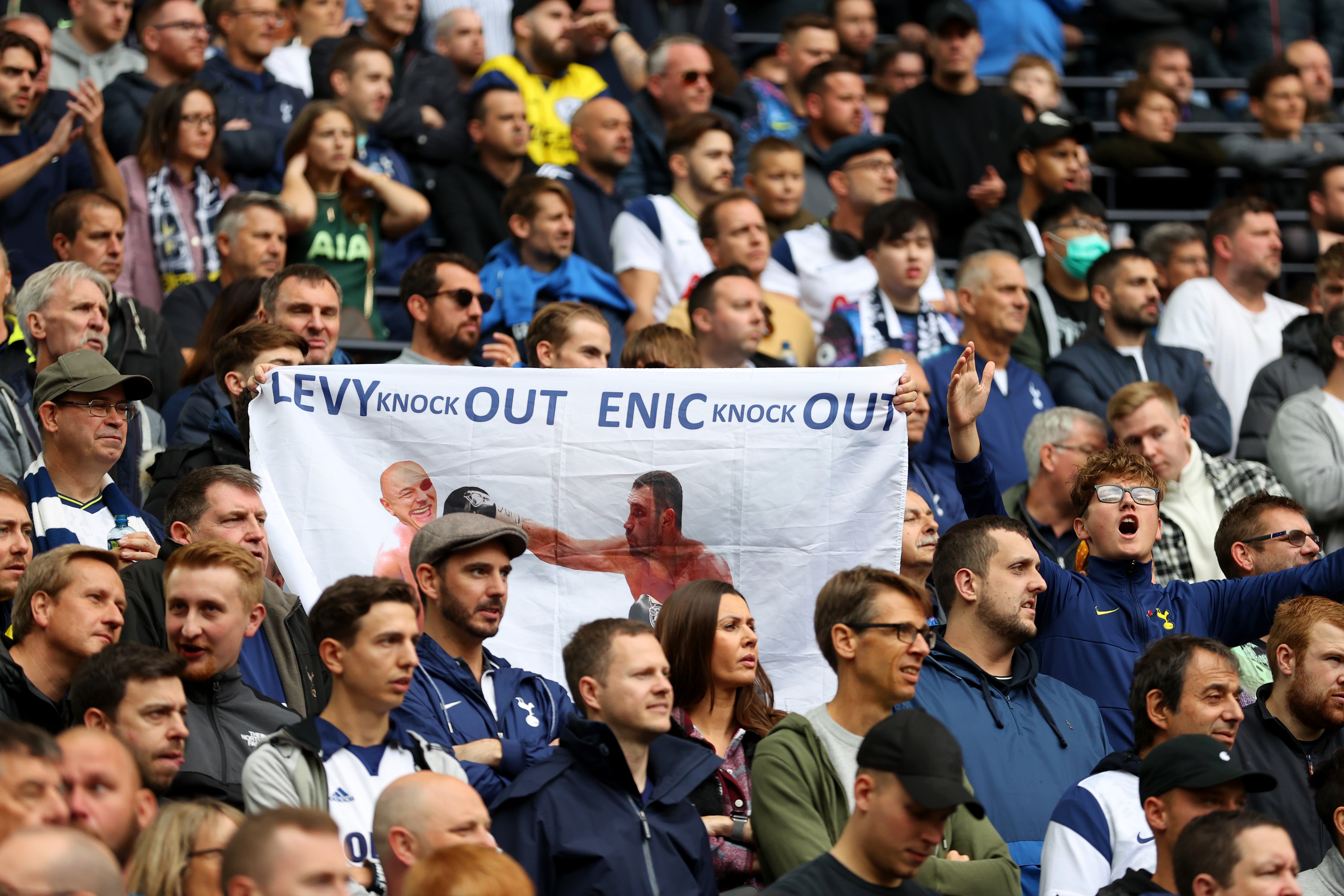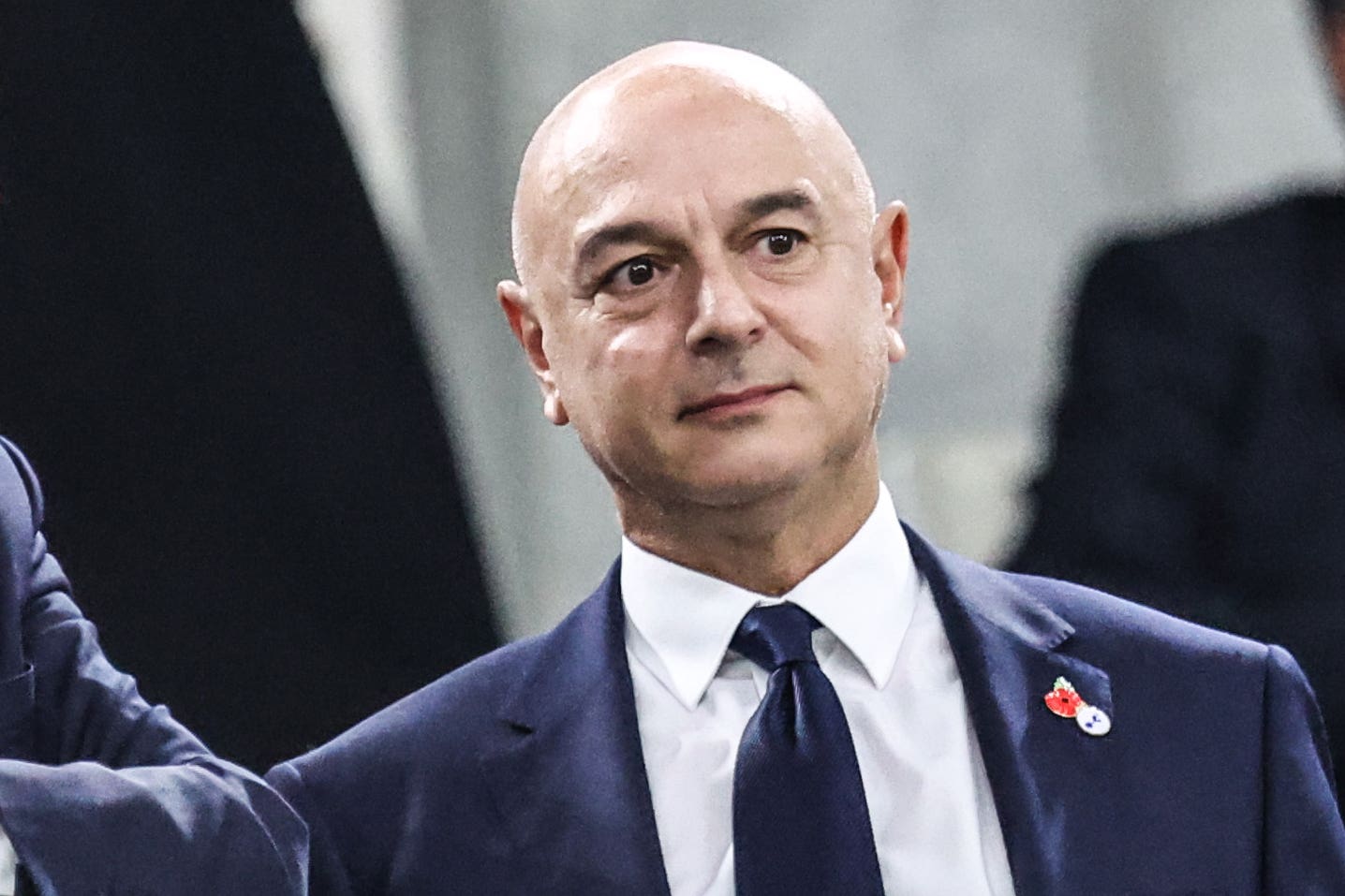Harry Kane saga leaves Tottenham paying the price for Daniel Levy’s ‘ego’ — again
Negotiations between Tottenham and Bayern Munich are still ongoing over Harry Kane, but Miguel Delaney looks at the cost of Levy’s notorious negotiating tactics

Your support helps us to tell the story
From reproductive rights to climate change to Big Tech, The Independent is on the ground when the story is developing. Whether it's investigating the financials of Elon Musk's pro-Trump PAC or producing our latest documentary, 'The A Word', which shines a light on the American women fighting for reproductive rights, we know how important it is to parse out the facts from the messaging.
At such a critical moment in US history, we need reporters on the ground. Your donation allows us to keep sending journalists to speak to both sides of the story.
The Independent is trusted by Americans across the entire political spectrum. And unlike many other quality news outlets, we choose not to lock Americans out of our reporting and analysis with paywalls. We believe quality journalism should be available to everyone, paid for by those who can afford it.
Your support makes all the difference.Earlier this summer, when there was still the feeling that Manchester United might come in for Harry Kane, it was put to one figure at the club that Bayern Munich were very confident of getting him.
"They have no experience of dealing with Daniel Levy," came the response. The German champions have since found out the very hard way.
Extremely late on in the Kane deal, just as the player was about to board the plane, negotiations were ongoing with Tottenham about the make-up of the final figures.
Levy has long been insistent that 80 per cent of the overall package should be guaranteed and the total fee should come to £120 million. This has made many people in the football industry roll their eyes, but it all reflects how the chairman has long divided Tottenham fans. The cries of “Levy out” and “get out our club” grew louder and louder last season, in that gleaming new stadium.
Those who back him, and have admittedly been the far quieter party lately, would point to how he has gradually built the club from a glamorous but underperforming name to one of the Premier League's “super clubs” with the best infrastructure in Europe. They were included in the Super League, after all. Levy is clearly adept at long-term macro business strategy.
Those who criticise him, and many of the fans would not even give him the credit for the business side, say this is constantly undercut by a short-term misunderstanding of football.
The entire Kane saga has almost encapsulated all of this. While Levy may get the maximum price, it could come at the cost of being able to prepare properly from a purely football perspective.
That is far from the first time that has been said. As one figure involved in negotiations said, “it’s almost impossible to get a star out of Spurs much before 31 August”. It was similar with Michael Carrick, Dimitar Berbatov, Luka Modric, Gareth Bale and now – the one the club and fans value above all of them – Kane.
Levy seeks to get absolutely everything out of the deal, cranking up the pressure as he himself remains unmoved.
Carrick once explained exactly what that was like. The midfielder was in a similar position to Kane in the summer of 2016, when he felt he had to leave for Manchester United to fulfil his talent. Carrick got so frustrated with Levy's refusal to deal with the Old Trafford hierarchy, though, that he decided to call the Spurs chairman himself. The repeated message back was simple.
“Well, they need to pay the money,” Levy said.

“It was all about the money for Daniel, just driving the price up and up,” Carrick wrote in his autobiography. “Arguing with Daniel was pointless. I would have got more joy talking to a brick wall.”
Carrick appealed again, and got the same response again.
“Well, they need to pay the money.”
Bayern are finding similar. A big question is whether this singular approach becomes self-defeating, especially when viewed from the other side.
Those who know Mauricio Pochettino say that he still has huge regrets that he didn't make his Spurs the force that Liverpool became, and puts it down to a refusal by the club to properly spend in 2017-18. The two clubs were then at a similar level but that was the point when Jurgen Klopp went big on Alisson and Virgil van Dijk.
Pochettino had requested some of the names that Liverpool wanted – including Sadio Mane – but Levy felt it was better to build in a sustainable way, with an emphasis on youth. The paths diverged. Liverpool went on to win the title and the Champions League, beating Spurs in the final. While Spurs went stale and Pochettino was eventually sacked.

So many involved feel that it was a huge missed opportunity, that in large part came from Levy's failure to understand there are key points when teams need further investment to reap much more.
There was a similar theme with Spurs’ sales. The Argentine had felt as early as 2017 that the team needed an overhaul and that it could actually be damaging to keep players around because of that danger of staleness. Levy insisted on huge prices for those like Danny Rose, though, and never got them. The team never refreshed.
It almost represented a classic false economy.
Those who defend Levy – and there are many in the game – would insist that is because he simply has to take an even longer-term view. The proof is in how Spurs have grown, and that stadium. Sources involved in the Super League say it was his business acumen that got Spurs into it since other executives wanted him but not the club.
This is the contrast that feeds into how divisive he is.
Levy gets the business side. He doesn't get the football side.
This can become an issue when, as many sources say, he gets so hands-on in deals. The three immediate successors to Pochettino were all bad appointments, that just didn't fit with what Spurs were.

They represented deviations from the club's philosophy. A perception has been that Levy got too distracted by big names – especially Jose Mourinho and Antonio Conte – forgetting what Spurs were. A place for up-and-coming players and managers to make their name; since they are not yet in that truly elite bracket of clubs. Ange Postecoglou at least represents an encouraging return to what would seem to be the best practice for Spurs.
Others in football who are more critical of Levy would go even further. They say a lot of this is about “ego”; that he needs to be involved; that he needs to get the best deals.
A common view is this can be self-defeating for Spurs, because it affects football preparation. Take the Kane negotiations, to come full circle.
Levy has long been adamant that he absolutely does not want to sell to an English club, because they are Spurs' competitors. That has long put off United, who just didn’t want to get into protracted and frustrated negotiations with Levy again.
But what has that resulted in? Had Spurs accepted the reality, which is that they are a level below United, they could have generated an auction that brought even more money. That’s how valuable Kane is.
Bayern will have to pay the price. The wonder is whether it also comes at some cost to Spurs and not just because they're losing one of their all-time greats.
Follow all the latest on our Premier League transfers live blog



Join our commenting forum
Join thought-provoking conversations, follow other Independent readers and see their replies
Comments